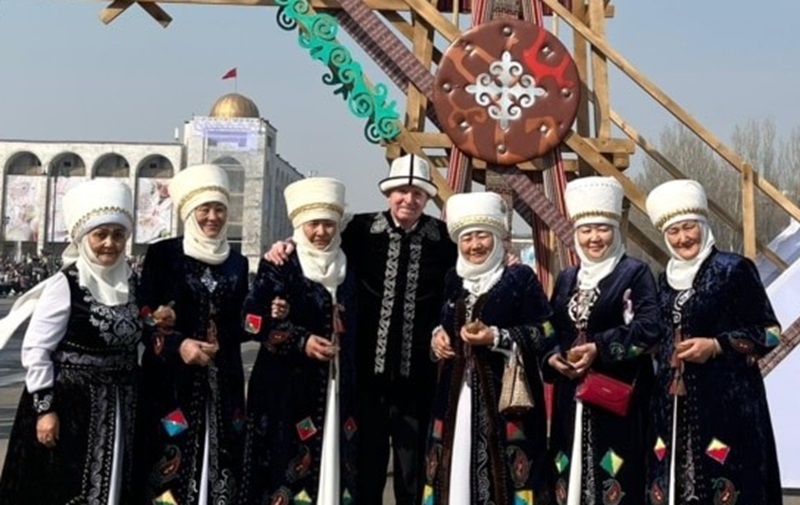La stanchezza della società civile a Biškek
On Azattyk, a review by Max Gdeorg Meier, coordinator of the Seidel Foundation, who spent 22 years in Kyrgyzstan promoting cooperation between Germany and the post-Soviet country. ‘The Kyrgyz people have never liked absolutist and oppressive governments’, but growing authoritarianism and the law ‘on non-commercial organisations’ are putting everything on the line again.
Biškek (AsiaNews) - In a conversation with Azattyk, Max Georg Maier, the coordinator of the German foundation named after the Bavarian prime minister of the 1960s, Hanns Seidel, took stock of his 20 years of activity on behalf of Kyrgyzstan. Well known to the citizens of the country for his kalpak, the typical Kyrgyz headgear, he spoke about the culture and popular consciousness of Kyrgyzstan in times of great change.
Maier observes that ‘the Kyrgyz people are particularly attached to nature, family and the older generation’, and even when they return to Germany, this leads them to have a special respect for plants and animals, especially horses. In his experience, he has been able to observe the transitions of the last decades, after gaining independence at the end of the Soviet empire. Comparing the experience of the two West and East Germanys, he notes that ‘even with all the support, problems still remain, and no one has given the Kyrgyz people as much help as we have given the East Germans’.
The end of the USSR had brought all production processes to a halt, industries and factories had come to a standstill, and unemployment was widespread at all levels, but many solutions were found, albeit with great effort, not least because ‘the Kyrgyz are very ductile, it is one of their best qualities’, assures the German expert. This year, Maier concludes his activity in Kyrgyzstan, returning to his homeland after 22 years, during which he immersed himself in the local values and culture. He is grateful for the ‘great welcome’ he has received, and extols the great energy of the Kyrgyz people, which was stifled in Soviet times.
The basis for all activities is the family culture, which helps to cope with any difficulties, and there has been no lack of ups and downs in local politics as well. For five years there was a parliamentary system, later replaced by the presidential system, emphasising the need for ‘a strong president, and at the same time a strong parliament’, and the institutions must be supported by ‘strong social organisations and a strong business sector’, assures Maier. He criticised the law ‘on non-commercial organisations’, the local variant of the measures against Russian-inspired ‘foreign agents’, and therefore also appealed to the authorities in Biškek, because ‘this law lowers the rating of Kyrgyzstan’.
The law was passed after lengthy discussions, and the German trader highlights two aspects: the technical one, recalling the first similar variant in 1999, and the many subsequent changes, which have closely affected the very activities of the Hanns Seidel fund, which is forced to submit new reports and balance sheets almost every month, creating enormous bureaucratic difficulties. ‘I think there are far too many rules for the activities of foreigners in Kyrgyzstan, there was no need for a further change,’ explains Maier.
An even more essential question concerns the conditions under which foundations such as Maier's opened in Biškek, and not in Tashkent or Astana: Kyrgyzstan presented itself as ‘an island of democracy in Central Asia’, a more liberal country that attracted many Western associations. The latest developments ‘have cast a negative shadow on the country's image’, which also now presents itself as an authoritarian state, not so different from neighbouring Tajikistan, whereas ‘if you look at history, the Kyrgyz people have never liked absolutist and oppressive governments’.
Now everything is back on the table, and the many businesses involved with relations abroad are waiting to see what their fate will be. Maier is confident in the ‘strength of Kyrgyz civil society’, even if it currently appears ‘rather tired and tried’, as the low voter turnout in the last elections also shows. He meanwhile returns to Germany with his Turkish wife and his 200 kalpaks, ‘a symbol of independence, great culture and harmony with nature’, trusting in the positive future of the Kyrgyz people.
25/11/2022 11:42
12/07/2005







.png)












